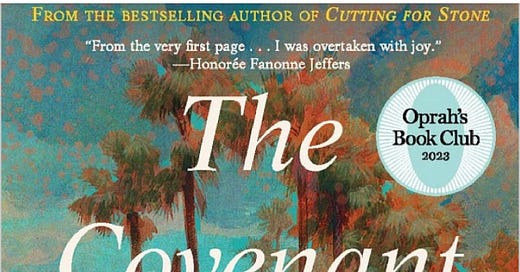India is a land of superlatives. This summer, it officially became the most populous country in the world (1.428 billion). In sheer land mass, it’s the seventh largest. In India, a total of 121 languages are spoken along with 240 additional dialects.
It should then come as no surprise that a country of such greatness would produce an eloquent, accomplished novelist like Abraham Verghese.
His latest novel, “A Covenant of Water”, follows four generations of an Indian Christian family in Kerala, India’s southern region. It begins in 1908 when Mariamma, a girl of 12, is promised in marriage to a man 40 years her senior that she has never met. After a period of adjustment, a romance develops and children follow. Mariamma becomes “Big Ammachi” (or Big Mama) and the overseer of the 500-acre family estate upon her husband’s death. Her son, Philipose, grows up to be a celebrated writer while his descendants in turn become physicians.
Typical rags-to-riches tale, right? Not exactly. In each generation, one member of the family will die by drowning, a fate known as "The Condition.” Is this pure coincidence or are these deaths caused by a rare neurological disorder? And biggest mystery of all: who will die next?
Paralleling the story of Big Ammachi’s family is that of Digby, a mild-mannered Scottish-born surgeon who comes to Kerala to practice. He seems to have a real skill for performing surgery, as well as falling in love with women married to someone else. Disillusioned in love, and with the politics of medicine, he leaves his position in Madras, and repairs to a remote village where he establishes a leper colony.
The interweaving of Big Ammachi’s and Digby’s stories guides the narrative of “A Covenant of Water.” The book deserves a Hollywood treatment from a director of the caliber of Ron Howard or Stephen Spielberg.
As a novelist, Verghese is no slouch when it comes to writing lyrically or explaining complex medical procedures in simple terms. A true Renaissance man, he trained as a doctor, but 30 years ago, decided he wanted to write, too. So he temporarily left medicine, was accepted at the Iowa Writers Workshop, and went on to write four best-selling books. Currently vice-chair of Stanford Medical School, Verghese received the National Humanities Medal from President Obama in 2015.
But back to the book. A bit on the long side with language that tends to the florid and overly romantic, it nevertheless showcases Verghese’s great gift for storytelling. And it paints a full picture of the changing state of India in the 20th century.
Note: for what’s it worth, the novel is also a selection of Oprah’s Book Club. Say what you will about the lady who once gave away cars to her TV audience. She also gives good advice.
Like this review? Follow me at “What Does Aug Think?” at acsntn.substack.com. Thank you!




Great review. Recently read “Cutting For Stone” which I loved and was sorry to finish. Looking forward to his newest book.